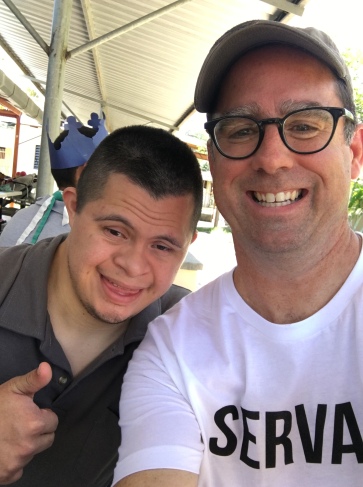What does it mean to be made in God’s image? That was the question I was confronted with as I visited the Hogar Padre Vito Guarato (Father Vito Guarato Home) just outside San Salvador.

I was in San Salvador to visit my friend Humberto Alfarez, who directs Sports Outreach in El Salvador, as well as get a better understanding of his ministry there. Humberto is an amazing man and servant of the Lord. He is a relationally-rich man. People love being around him. They are drawn to his love for the Lord and his love for them. That was on full display when we arrived at the Guarato Home.
The Father Vito Guarato Home is an orphanage where more than 120 children, teens and adults with severe mental and physical handicaps are loved and cared for by a team of doctors, nurses and 100 or so aides.
The orphanage is an oasis carved out of the rugged mountains. A beautiful sanctuary acts as a physical and spiritual hub for the compound. All of the other buildings radiate out from the sanctuary like spokes on a wheel. After a brief tour of the compound, we gathered in the sanctuary for their daily mass. The front was lined with wheel chairs for the physically disabled while those with mental disabilities sat in chairs next to our team.
Amidst the cacophony of sounds from these worshippers, I was struck that even though I couldn’t understand what they were saying, I knew that God did. He has “ears to hear” the worship of his children, whether it is intelligible or not. I was deeply touched by what I witnessed and experienced.
After the service, our team and the residents gathered under a shelter for snack time. This was my first chance to really interact with these residents. I was paired with a gentlemen who was on a liquid diet because of his condition. My instructions were simple. Help him drink the bottle. That’s it.
It turns out that he wanted to drink it himself. I wanted to oblige him, but I had been instructed not to let him do it. It became this tug-of-war that ended with him wearing about half of the liquid on his shirt. Fail!
Up until that happened, I had just felt uncomfortable being there. Now I felt helpless…even useless. I couldn’t even do the simplest of things. How ironic. I felt emotionally what they daily experienced physically and mentally. I, who was fully able, found myself disabled and powerless. It reminded me of something Henri Nouwen observed when he went to live in a L’Arche community in Toronto. He captured it in his book, In The Name of Jesus. He wrote…
“the first thing that struck me when I came to live in a house with mentally handicapped people was that their liking or disliking me had absolutely nothing to do with any of the many useful things I had done until then. Since nobody could read my books, the books could not impress anyone, and since most of them never went to school, my twenty years at Notre Dame, Yale, and Harvard did not provide a significant introduction. My considerable ecumenical experience proved even less valuable. When I offered some meat to one of the assistants during dinner, one of the handicapped men said to me, “Don’t give him meat. He doesn’t eat meat. He’s a Presbyterian.” Not being able to use any of the skills that had proved so practical in the past was a real source of anxiety…these people forced me to let go of my relevant self—the self that can do things, show things, prove things, build things—and forced me to reclaim that unadorned self in which I am completely vulnerable, open to receive and give love regardless of any accomplishments.”
I felt that keenly. I felt wrecked by it.
Furthermore, what did it mean to be made in God’s image? It surely doesn’t mean health and wholeness. It doesn’t mean accomplishments. Here before me were children, teenagers and adults whose bodies and minds were broken beyond repair. Yet, they smiled. They laughed. They loved. They had an endless joy that was contagious. Is it possible that they embodied child-like faith in God more than I did? It sure felt that way. Listen to what Jesus says in Matthew 18:2-4. “And calling to him a child, he put him in the midst of them and said, “Truly, I say to you, unless you turn and become like children, you will never enter the kingdom of heaven. Whoever humbles himself like this child is the greatest in the kingdom of heaven.” I think if there had been a disabled child or adult present, he might have said the same thing about them. The greatest in the kingdom won’t be the highest degreed person or the most accomplished person, it will be the humble man, woman and child who know their neediness and look to Jesus alone to save them, to heal them and to restore them.
I wonder if that feeling of helplessness and powerlessness I experienced isn’t the kind of humility we are to come to Jesus with. To readily and eagerly admit our utter dependence upon his grace and mercy to do anything. Anything! To see that our value to God isn’t our physical or emotional or mental wholeness. It’s not even our spiritual wholeness that makes us valuable to God. It’s just the opposite. It’s our brokenness that attracts God to us. It’s our weaknesses that prompts God’s pursuit of us. Praise God for his faithful and relentless pursuit to make us His children. May I possess such child-like faith that would lead to maturity in Christ.
Write a Comment
Comments for this post have been disabled.